Related Research Articles

The politics of Russia take place in the framework of the federal semi-presidential republic of Russia. According to the Constitution of Russia, the President of Russia is head of state, and of a multi-party system with executive power exercised by the government, headed by the Prime Minister, who is appointed by the President with the parliament's approval. Legislative power is vested in the two houses of the Federal Assembly of the Russian Federation, while the President and the government issue numerous legally binding by-laws.

Vladimir Vladimirovich Putin is a Russian politician and former intelligence officer who has served as President of Russia since 2012, having previously served from 2000 to 2008. Putin also served as Prime Minister of Russia from 1999 to 2000 and again from 2008 to 2012. At 24 years, 11 months and 10 days, he is the longest-serving Russian or Soviet leader since the 30-year tenure of Joseph Stalin.
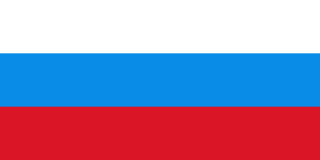
The modern history of Russia began with the Russian SFSR, a constituent republic of the Soviet Union, gaining more political and economical autonomy amidst the imminent dissolution of the USSR during 1988–1991, proclaiming its sovereignty inside the Union in June 1990, and electing its first President Boris Yeltsin a year later. The Russian Soviet Federative Socialist Republic was the largest Soviet Socialist Republic, but it had no significant independence before, being the only Soviet republic to not have its own branch of the Communist Party.

Boris Abramovich Berezovsky, also known as Platon Elenin, was a Russian business oligarch, government official, engineer and mathematician and a member of the Russian Academy of Sciences. He had the federal state civilian service rank of 1st class Active State Councillor of the Russian Federation.

In September 1999, a series of explosions hit four apartment blocks in the Russian cities of Buynaksk, Moscow, and Volgodonsk, killing more than 300, injuring more than 1,000, and spreading a wave of fear across the country. The bombings, together with the Invasion of Dagestan, triggered the Second Chechen War. The handling of the crisis by Vladimir Putin, who was prime minister at the time, boosted his popularity greatly and helped him attain the presidency within a few months.

Grigory Alekseyevich Yavlinsky is a Russian economist and politician. He has held numerous positions in the Soviet and Russian governments across different levels, including in the State Duma.
Russian oligarchs are business oligarchs of the former Soviet republics who rapidly accumulated wealth in the 1990s via the Russian privatisation that followed the dissolution of the Soviet Union. The failing Soviet state left the ownership of state assets contested, which allowed for informal deals with former USSR officials as a means to acquire state property.

Boris Yefimovich Nemtsov was a Russian physicist, liberal politician, and outspoken critic of Vladimir Putin. Early in his political career, he was involved in the introduction of reforms into the Russian post-Soviet economy. In the 1990s under President Boris Yeltsin, he was the first governor of the Nizhny Novgorod Oblast (1991–1997). Later he worked in the government of Russia as Minister of Fuel and Energy (1997), Vice Premier of Russia and Security Council member from 1997 to 1998. In 1998, he founded the Young Russia movement. In 1998, he co-founded the coalition group Right Cause and in 1999, he co-formed Union of Right Forces, an electoral bloc and subsequently a political party. Nemtsov was also a member of the Congress of People's Deputies (1990), Federation Council (1993–97) and State Duma (1999–2003).
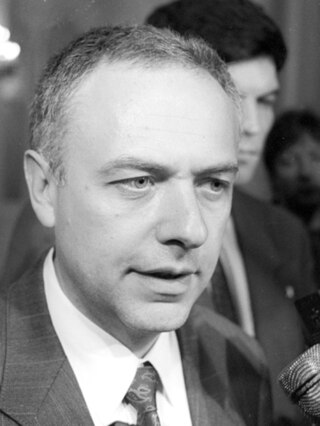
Andrei Vladimirovich Kozyrev is a Russian politician who was the Minister of Foreign Affairs under President Boris Yeltsin, during the Russian SFSR from 1990 and during the Russian Federation from 1992, in office until 1996. Kozyrev was seen as supporting Yeltsin's liberal democratic outlook and tried to develop Russia's foreign policy immediately after the fall of the Soviet Union to no longer see NATO as a threat, pursue integration with the West, and not assert itself in the former Soviet countries. Kozyrev's pro-Western and liberal foreign policy fell out of favor because of NATO expansion that began from 1995, and he was replaced by Yevgeny Primakov in early 1996, who represented Russian "security state" interests.

The United States and Russia maintain one of the most important, critical, and strategic foreign relations in the world. Both nations have shared interests in nuclear safety and security, nonproliferation, counterterrorism, and space exploration.

Richard Sakwa is a British political scientist and a former professor of Russian and European politics at the University of Kent, a senior research fellow at the National Research University-Higher School of Economics in Moscow, and an honorary professor in the Faculty of Political Science at Moscow State University. He has written books about Russian, Central and Eastern European communist and post-communist politics.

Russian nationalism is a form of nationalism that promotes Russian cultural identity and unity. Russian nationalism first rose to prominence as a Pan-Slavic enterprise during the 19th century Russian Empire, and was repressed during the early Bolshevik rule. Russian nationalism was briefly revived through the policies of Joseph Stalin during and after the Second World War, which shared many resemblances with the worldview of early Eurasianist ideologues.
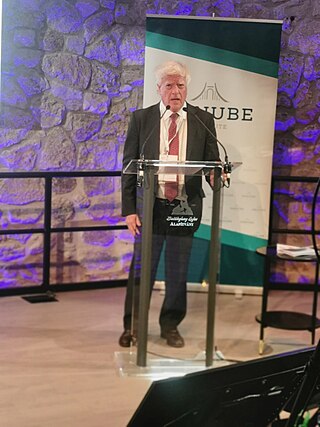
David A. Satter is an American journalist and historian who writes about Russia and the Soviet Union. He has authored books and articles about the decline and fall of the Soviet Union and the rise of post-Soviet Russia.
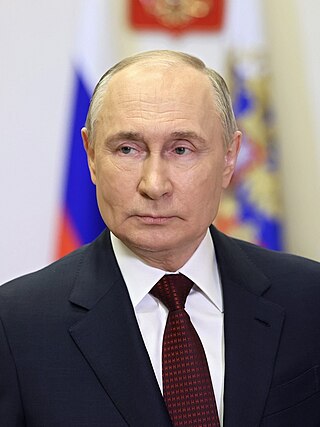
Since 1999, Vladimir Putin has continuously served as either president or Prime Minister of Russia.

Boris Nikolayevich Yeltsin was a Soviet and Russian politician and statesman who served as the president of Russia from 1991 to 1999. He was a member of the Communist Party of the Soviet Union from 1961 to 1990. He later stood as a political independent, during which time he was viewed as being ideologically aligned with liberalism.

Putinism is the social, political, and economic system of Russia formed during the political leadership of Vladimir Putin. It is characterized by the concentration of political and financial powers in the hands of "siloviks", current and former "people with shoulder marks", coming from a total of 22 governmental enforcement agencies, the majority of them being the Federal Security Service (FSB), Ministry of Internal Affairs of Russia, Armed Forces of Russia, and National Guard of Russia. According to Arnold Beichman, "Putinism in the 21st century has become as significant a watchword as Stalinism was in the 20th."
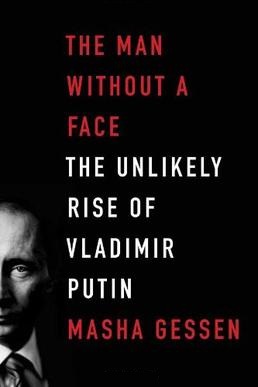
The Man Without a Face: The Unlikely Rise of Vladimir Putin is a 2012 book by Masha Gessen about Vladimir Putin and his rise to power and reign. Gessen's analysis of Putin is mostly speculative, but they carefully investigate his own revealing accounts of his life, and they use interviews with people who knew Putin, before he rose to power, to form their conclusions.
Richard Lourie is an American historian and American foreign policy expert on Russia–United States relations, on which he consulted for Hillary Clinton in her failed 2008 presidential run. He served as Gorbachev's translator, has written a fictional autobiography of Joseph Stalin, a biography of Andrei Sakharov, and a prognosticative biography Putin: His Downfall and Russia's Coming Crash, which explores the education and ascent of Putin during the dissolution of the USSR, and his career as Russia's autocrat, in order to estimate his probable future moves, while diagnosing Russia's spiritual ills and "narcissistic injuries" and "utter dependence on the ongoing will to power."
Maria AlexandrovnaLipman is a Russian journalist, political scientist and Russia expert, who edited the magazine of the Carnegie Moscow Center until 2014. She is a Senior Visiting Fellow at the Institute of European, Russian and Eurasian Studies at George Washington University and Co-Editor of the Institute's website Russia.Post. She also writes for Foreign Affairs.
This is a select bibliography of English language books and journal articles about the history of Russia and its empire from 1991 to present. It specifically excludes topics related to the Dissolution of the Soviet Union; see Bibliography of the Post Stalinist Soviet Union for information on this subject. This bibliography is restricted to works about Russian history, and specifically excludes items such modern travel logs and guide books, popular culture, etc.
References
- Lourie, Richard (29 January 2019). "Out of the Picture: On Tony Wood's "Russia Without Putin: Money, Power and the Myths of the New Cold War"". LA Review of Books.
- Lipman, Maria (12 August 2019). "A Review of "Russia Without Putin: Money, Power, and the Myths of the New Cold War"". Foreign Affairs.